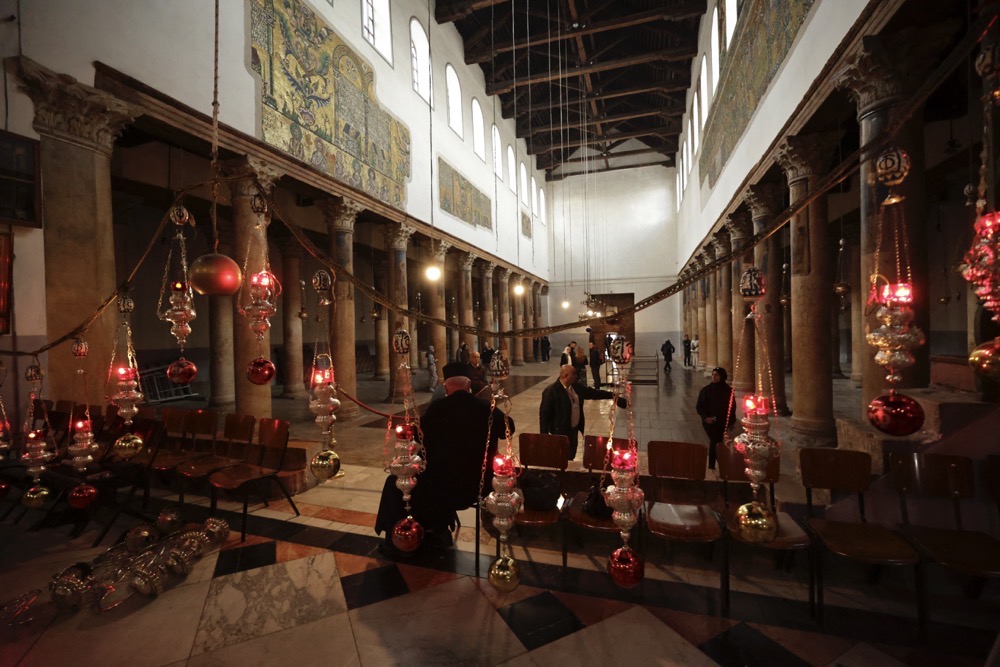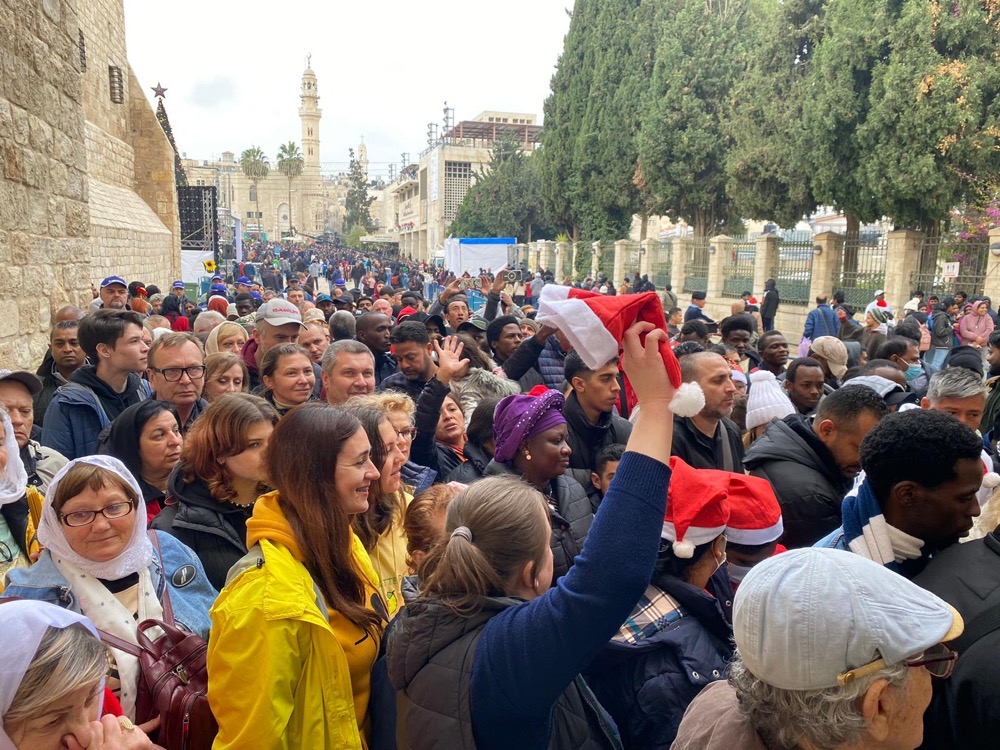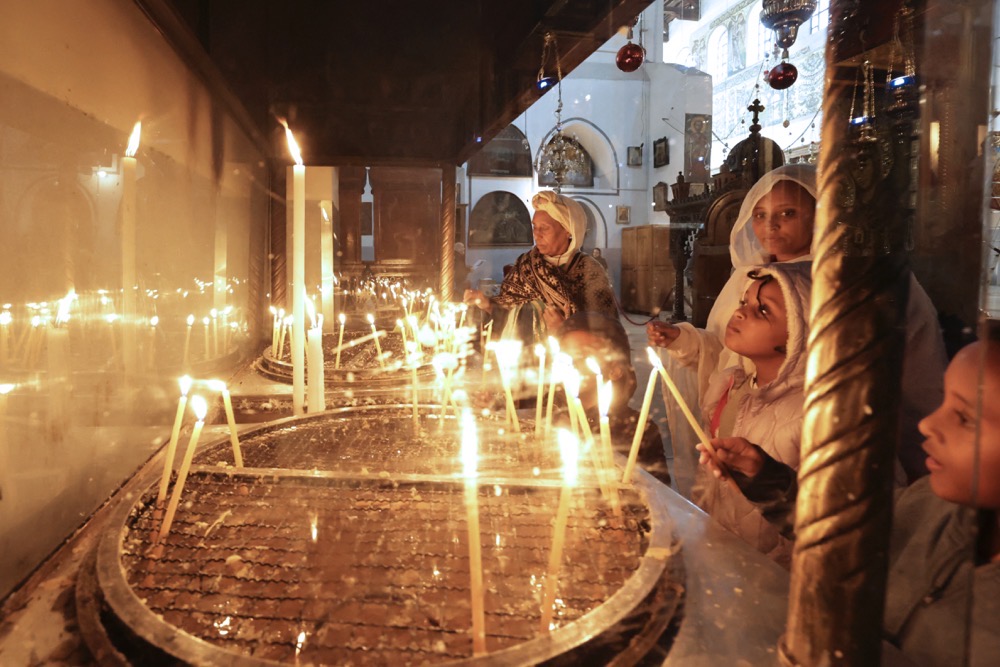RAMALLAH, PALESTINE: Despite the imminent emergence of a radical-right government in Israel, in the Palestinian city of Bethlehem residents and visitors alike had been preparing to celebrate Christmas, with tens of thousands of pilgrims and religious tourists joining the festivities this year.
The municipality, which recognizes the religious and historical importance of the city for Christians worldwide, dubbed this year’s events: “From Bethlehem to the world; the spirit of Christmas brings us together.”
Preparations began in the West Bank four months ago. At the time, Bethlehem Mayor Hanna Hanania called on “all the faithful and peace-loving peoples of the world” to visit Bethlehem and Palestine and make a pilgrimage to the Holy Land to practice their faith and religious rites.”
He told Arab News: “Bethlehem wears a new suit of joy, and hope has returned to the hearts of the city’s citizens after a long absence; we look forward to a distinguished Christmas this year.”
Bethlehem is home to about 30,000 people. While the city is Muslim-majority, it has a deep-rooted Christian community. The city is considered sacred, as it is the birthplace of Jesus Christ in the Gospels.

Bethlehem Mayor Hanna Hanania called on “all the faithful and peace-loving peoples of the world” to visit Bethlehem. (AFP)
Thousands of local Christians and foreign pilgrims flock to Bethlehem on Dec. 24 every year to receive the procession of the Latin Patriarch of Jerusalem, who arrives at the Church of the Nativity to preside over midnight mass.
The mass, which is attended by the Palestinian president and prime minister, international figures, prominent Arab diplomats, ambassadors and consuls, is broadcast on television around the world.
Ahead of the Christmas holidays, trees are decorated and brightly lit in the main squares of Palestine’s cities. Scout troops march along the main streets, playing drums and bagpipe music. In the evening hours, Santa Claus’ procession passes by.
In the weeks before Christmas, markets spring up in Christian-populated towns. Here, Christians can buy food and gift items. Muslims share in the festivities with their Christian friends and neighbors.
The number of tourists visiting Bethlehem has recovered since the easing of pandemic restrictions. As more than 50 percent of the city’s income depends on tourism, these numbers are good news for the craftsmen, tour guides and other hospitality industry professionals.
Today, Bethlehem has 56 hotels, including 4,500 hotel rooms, that can accommodate 9,000 people, 100 antique stores, 400 traditional crafts workshops and 20 large tourist restaurants.
Although the Palestinian Central Statistics Center estimates that Bethlehem’s tourism sector lost $1.5 billion in 2020 and 2021 due to the coronavirus pandemic, this season could see a significant comeback.

Bethlehem has 56 hotels, including 4,500 hotel rooms, that can accommodate 9,000 people, 100 antique stores, 400 traditional crafts workshops and 20 large tourist restaurants. (Supplied)
Elias Al-Arja, owner of the Bethlehem Hotel, told Arab News that his and other venues across town are fully booked as crowds of religious tourists flock to the city for Christmas.
“We are delighted with the return of tourism to Bethlehem despite the difficult security situation in the Palestinian Territories and the Ukraine war,” said Al-Arja, who predicts tourism will return to pre-pandemic levels in 2023.
The Palestinian Authority has deployed hundreds of security personnel in Bethlehem for the occasion.
Palestinian police spokesman Brig. Gen. Zneid Abu Zneid told Arab News that 1,500 security personnel, under the supervision of the police commander, Major General Youssef Al-Hilew, are on duty to protect the public.
Ghadir Najar, an architect from East Jerusalem, told Arab News that Christians in Jerusalem resist Israeli restrictions preventing their freedom of movement. She says she and her family will go to Bethlehem on Saturday to participate in midnight mass.
The number of Christians in the Palestinian Territories is falling, said Najar, as large numbers have emigrated to Sweden and the US in recent years in search of opportunities. Bethlehem is among the poorest cities in the Palestinian Territories.
Palestinian Christians predominantly live in Bethlehem, Jerusalem, Beit Jala, Beit Sahour, Ramallah and Bir Zeit. Others live in the towns and villages of Nazareth, Haifa and Galilee inside Israel.

Preparations began in the West Bank four months ago. (Supplied)
According to the latest official data, their numbers in the West Bank and the Gaza Strip are about 42,000, with a further 140,000 living inside Israel. Their number in Ramallah is 11,000, with 2,000 of them natives of the city and 9,000 having migrated there from elsewhere in Palestine.
Nazih Dahdal, owner of the Beauty Inn Hotel in Ramallah, told Arab News that religious tourism made up about 80 percent of the tourism market in the Palestinian Territories this year.
These tourists primarily hail from France, Italy, Germany, Turkiye and the US. He says the number of domestic tourists — Palestinians living in Israel — has fallen due to the security situation in the West Bank.
Dahdal says he will not hold a New Year’s Eve party as he did in previous years, fearing clashes between Palestinians and Israeli security forces will force him to cancel.
Despite the difficult security situation, the lobby of the Beauty Inn Hotel is decorated with a giant Christmas tree.
“Previously, Christmas had a better presence and flavor than today,” Dahdal said. “But aspects of Christmas today are better, especially with the participation of Christians from other cities in the Palestinian Territories.”
















